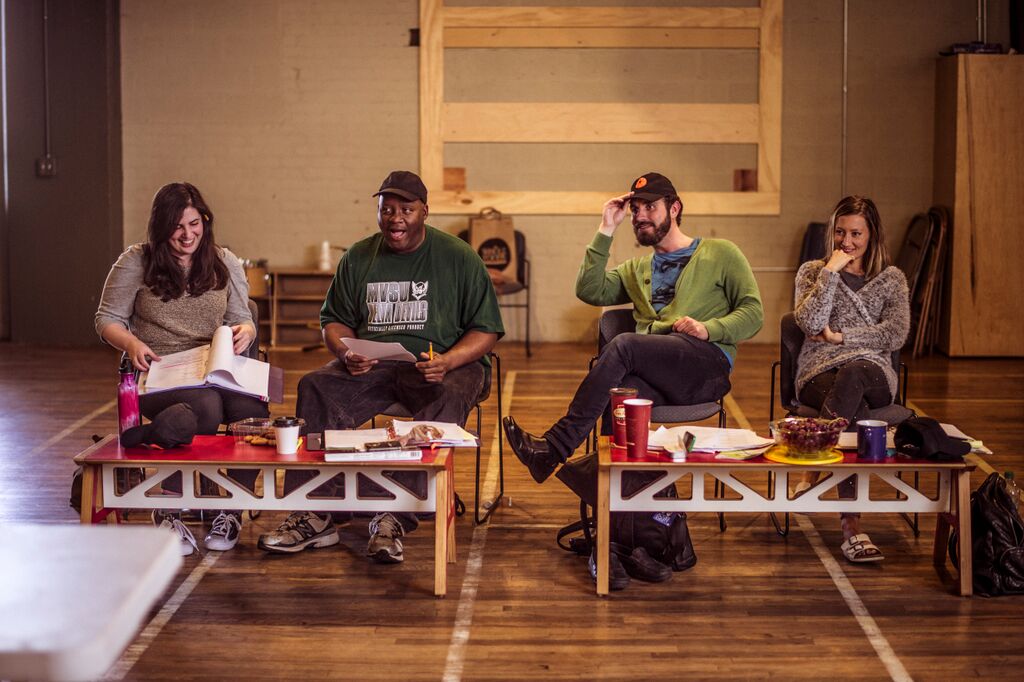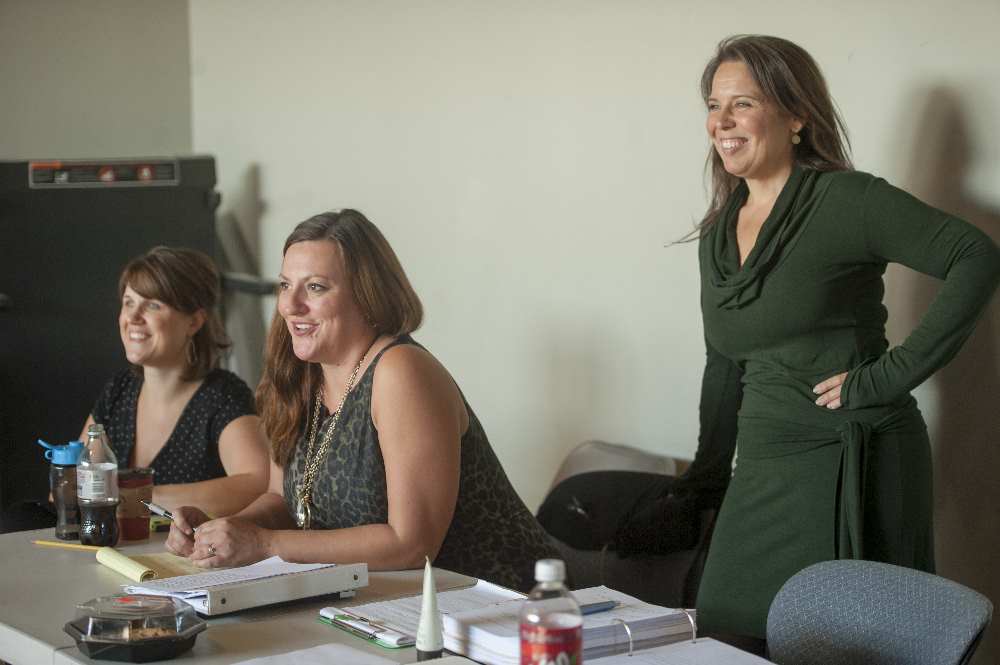DETROIT: Sarah Clare Corporandy remembers the reactions she got when she told people she was relocating to Detroit to earn her masters in arts administration at Wayne State University.
“Their faces cringed,” she said. “They were like, ‘Oh God, I hope you’re going to be okay!’” While the “usual reaction to my move was concern or fear, a lot of these people had never even been to Detroit.” Still, Corporandy confessed: “I grew up in Michigan, and I hadn’t spent a lot of time in the city; I think I had that fear, too.”
Now that Corporandy is launching one of the city’s newest theatrical companies, the Detroit Public Theatre, which kicks off its inaugural season on Oct. 30 with Bess Wohl’s American Hero, the city’s reputation has turned around, and so have the reactions. “It’s now become, when you tell people you’re moving to Detroit, the reaction on is not a face of disgust,” she said. “It’s like, ‘Holy shit, that is so awesome.'”
There’s no question that Detroit had fallen into economic despair in the years that led up to its 2013 bankruptcy.
“The streetlights hadn’t been working; the garbage hasn’t been getting picked up,” recalled Courtney Burkett, one of the theatre’s cofounders. “The bankruptcy was actually the first step in so much changing and getting better—I felt like we really turned a corner when [Detroit] declared bankruptcy.”
Indeed, efforts like DPT are part of an encouraging trend, as artists from all over the country are now taking advantage of a new, vibrant, artistic Detroit emerging from the ashes of urban blight. The theatre’s other cofounder, Sarah Winkler, left New York to be join the influx. Only Burkett is a proud, born-and-bred Detroiter.
With the city basking in a creative second coming, the three women felt they couldn’t pass up on the chance to join the renaissance in a Midwestern metropolis known for automobiles and Motown. And while Detroit has plenty of longstanding suburban and storefront theatres in and around the city, including Detroit Repertory Theater, the DPT team is hoping to provide city dwellers and suburbanites alike with adventurous contemporary works.
The idea for the company arose shortly after Winkler and Burkett met. Prior to moving to the city two years ago, Winkler was a producing artist and actor with New York’s Epic Theatre Ensemble. The play No Child…, which had its origin at Epic before an Off-Broadway run and national tour, found itself in the hands of Burkett, who directed it in Detroit. Upon meeting after one performance, the two decided to collaborate on a production. But they quickly realized that they should be doing more; they were “thinking too small.”
Hoping to become a cultural staple for the city, DPT is modeled after New York’s Public Theater (hence the name). Its mission: not only to foster new artists and dig into the community with theatre programming, but present challenging new works. Located in the heart of the city’s midtown, the company is in residence at the Detroit Symphony Orchestra’s Max M. Fisher Music Center in the Robert A. and Maggie Allessee Rehearsal Hall, which can seat anywhere from 150 to 300. A short-term dream, according to Winkler, is to evoke a Lincoln Center-esque atmosphere in Detroit: People always coming and going, running off to a movie, a symphony performance, or, hopefully, a Sunday matinee.

For Burkett, the long-term plan for DPT is to become a nurturing haven for Detroit artists and companies. Ten years from now, Burkett predicts (with crossed fingers) that DPT will be in its own space, fostering burgeoning companies that want to expand and experiment, much as the DSO is doing for them now. In addition, the community has been so encouraging that it’s given the DPT team a refreshing, jolt of inspiration. In addition to the DSO’s rent discount and the support of some of the city’s key development leaders, Winkler noted that several storefront theatres and surrounding suburban companies, including the regional Detroit Repertory Theatre, are excited to welcome the young organization.
“What it feels like is that the theatre is part of this much bigger goal for this city,” Corporandy said. “The analogy that I can give is that it feels like there’s a bunch of people holding something up and there’s gaps where we need more people. We are coming in and putting our hands up, and next to us is another cultural institution and bunch of entrepreneurs, and everyone is smiling at each other, and everyone wants each other to succeed.”
This collaborative spirit is one of the reasons the staff of DPT feel it’s crucial to give back to the city. All three leaders have worked within arts and education, developing programs that can engage community, such as their Shakespeare Behind Bars program, in which the company brings actors in to the Women’s Huron Valley Correctional Facility to work with the inmates on a new Shakespeare play.
Additionally, DPT is building a pilot program alongside Detroit Public Schools that will bring teaching artists into schools and students into the theatre, developing a curriculum to complement a specific lesson plan. This year, the company’s season finale, Detroit ’67, written by city native Dominique Morisseau, will speak to the schools’ civil rights unit. There are also plans to offer pay-what-you-can nights and $10-ticket performances for audiences.
“Accessibility is extremely important to us,” said Winker. “It’s also important to us that people understand that art has value, and that if pay-what-you-can is just a quarter, it has value.”
These programs are intended to help bring Detroit, both the city at large and the artistic community, closer together, as are this season’s four shows, which Winkler said basically “chose themselves” as the inaugural lineup. The slate includes Detroit ’67, American Hero, Laura Eason’s Sex with Strangers, and Eric Gutman’s musical From Broadway to Obscurity.
“We want to explore the human experience,” said Burkett. “And I think the human experience in Detroit is different than the human experience in Cleveland or in Chicago or in New York. I hope that the stories we’re telling will resonate particularly with the community.”
The DPT team believes the stories they’re telling and the theatre they’re building parallel the real-life narrative happening all over Detroit: a story of rebirth that can only be told in this city.
“I am a theatre artist and a Detroiter,” said Burkett. “Actually, I think I’m actually a Detroiter first and then a theatre artist. I don’t think I can do what I do anywhere else. I’ve tried, but this is my place.”
Josh Austin is a freelance arts journalist. He is an associate editor of The Sondheim Review and has written for publications such as Backstage, The Post and Courier, The Post-Standard, The Syracuse New Times, and Broadway World.


